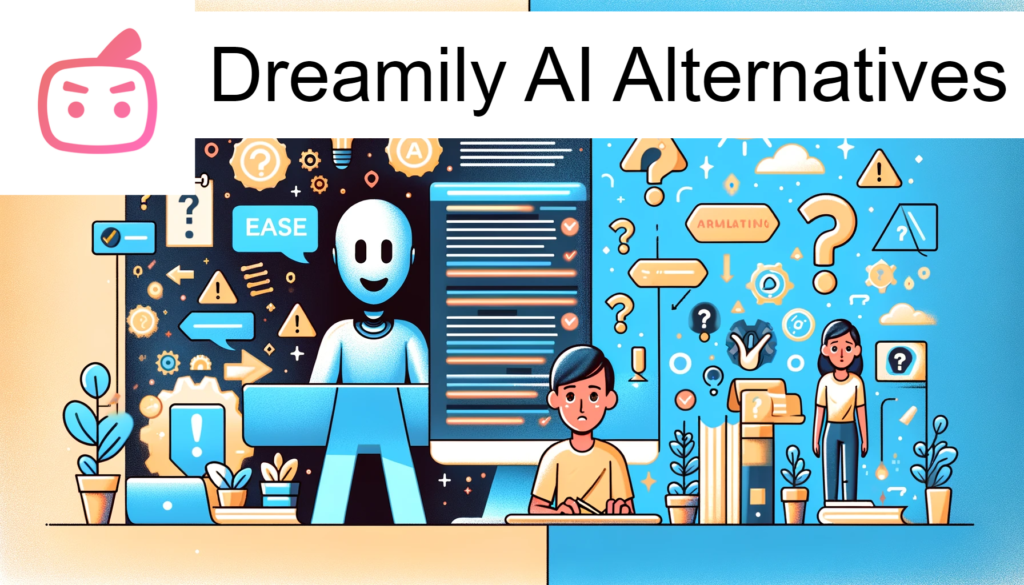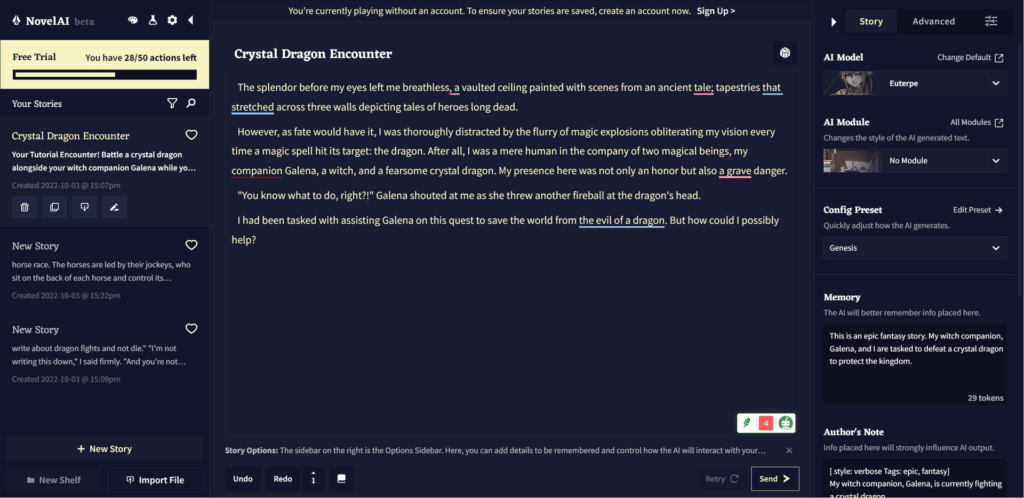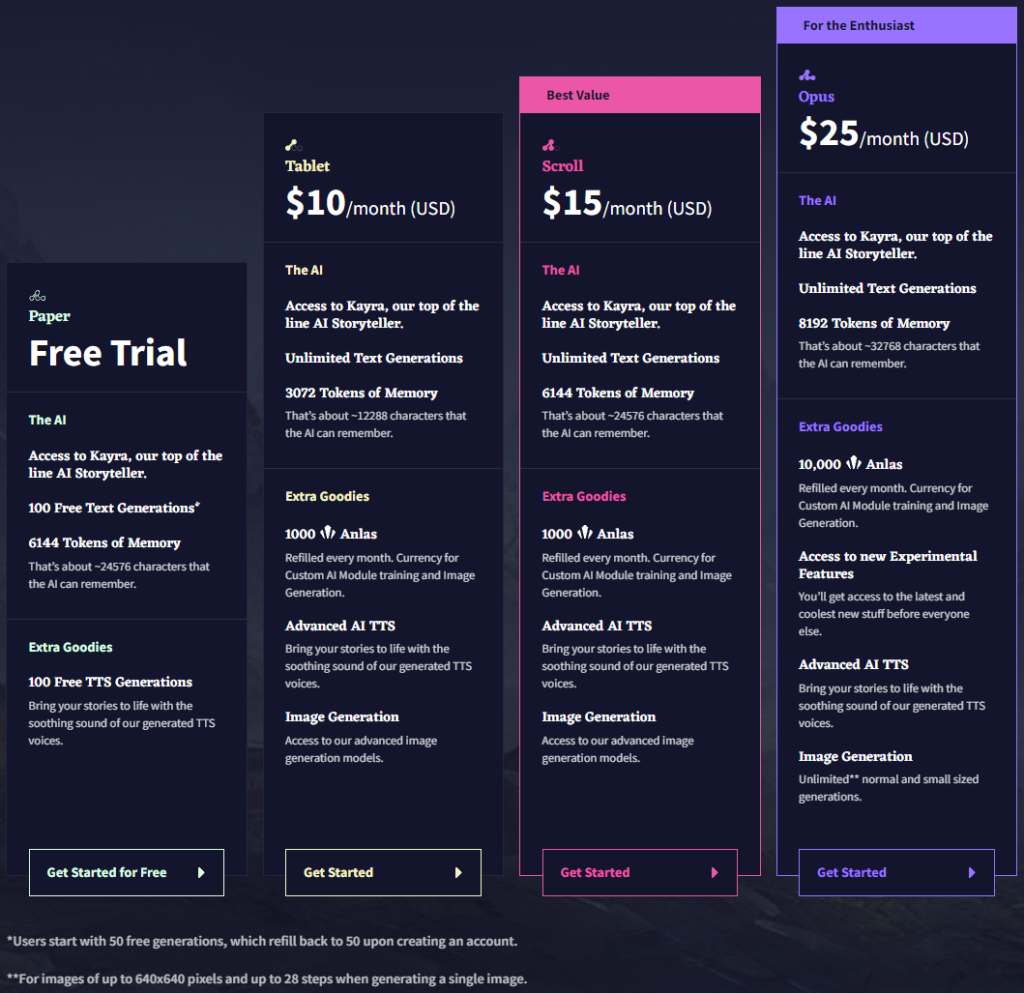
If you’re looking for alternatives to Dreamily AI, there are several tools and AI generators you might consider for your creative writing and storytelling. Each has its unique features and strengths, so your choice will depend on your specific needs and preferences. But before, lets quickly see why you may not considering DreamilyAI:
What’s Dreamily AI
Dreamily is an innovative AI-powered tool designed to assist with creative writing and storytelling. Created by Phillip Jiang on February 8, 2021, it has become a popular platform for literature enthusiasts and creators. Its primary objective is to cater to the creative needs of individuals, offering a unique approach to crafting narratives with the help of artificial intelligence.

Here are some of the key features of Dreamily AI:
- AI-Driven Creative Writing: Dreamily AI leverages AI to assist users in storytelling, enabling them to create diverse worlds and narratives with basic prompts, characters, and plot ideas.
- Interactive Character Building: The platform allows users to develop intricate character relationships and interactions, adding depth and complexity to each story.
- Global Reach: Dreamily AI has a user base spanning over 200 countries, highlighting its widespread popularity.
- Collaborative Storytelling: It features a “Dreamily GO” button that enables users to co-create stories with the AI, offering different plot directions to choose from.
- Multiple Writing Styles: The platform offers several built-in writing modes, each with a unique style, catering to different creative visions.
- Word Count Control: Users can specify the desired word count for their narratives and make manual edits and modifications.
- Mobile and Web Accessibility: Dreamily AI is available as an app for Apple and Android devices and can be accessed online via a browser-compatible version.
- Free to Use: The platform is completely free, making creative storytelling accessible to everyone.
- Talk to Characters: Using natural language processing AI, writers can interact with characters they create, which is particularly useful for developing plotlines or understanding character motives.
- Customization Features: Dreamily includes a ‘Dreamipedia’ for character details, a banned words feature to refine writing style, and options for setting the number of words in AI suggestions.
Pros and Cons of Dreamily AI
The pros and cons of Dreamily AI, based on various sources, are as follows:

Pros:
- AI-Driven Creative Writing: Dreamily AI leverages AI for storytelling, allowing users to create intricate narratives and character interactions.
- Interactive Character Building: Users can develop detailed character relationships, adding depth to stories.
- Collaborative Storytelling: Features like the “Dreamily GO” button enable co-creation of stories with AI, offering multiple plot directions.
- Multiple Writing Styles: Various built-in writing modes cater to different creative preferences.
- Customization Options: Includes features like Dreamipedia for character details and a banned words list to refine writing style.
- Word Count Control: Users can set the desired word count for narratives.
- Talk to Characters: Using natural language processing AI, writers can interact with their characters.
- Mobile and Web Accessibility: Available as an app and online, offering flexibility.
- Free to Use: Makes creative storytelling accessible to everyone.
- Global Reach: Has a user base in over 200 countries.
Dreamily AI Cons:
- Early Development Stage: Dreamily AI is still evolving, which might limit some features.
- Limited Writing Styles: While it offers multiple styles, they may not cater to all genres or preferences.
- Banned Words Limitation: The banned words feature, while useful, can sometimes overly restrict the AI’s output.
- Dependence on User Input: The quality of AI suggestions can vary based on the user’s input clarity.
- No Offline Mode: The platform requires an internet connection to function.
- No Multi-User Collaboration: Currently, it doesn’t support multiple users working on the same story simultaneously.
- Limited to Set Words: The word count control, while offering flexibility, also limits the length of narratives.
Dreamily AI is a unique tool that offers many benefits for creative writing, particularly for those interested in leveraging AI for storytelling. However, like any tool, it has limitations that may affect its suitability for certain users or projects.
The Top Alternatives to Dreamily AI

Some Dreamily AI alternatives for story writing and content generation include:
- Novel AI: An AI-assisted creative writing tool for literary enthusiasts and creators.
- WriteHolo AI: This is one of the top competitors to Dreamily AI, known for its content creation capabilities.
- DeepStory.ai: An alternative that provides AI-assisted content generation.
- InferKit: A platform that uses AI algorithms to create writing based on user input, enabling the production of quality literature.
- AI Dungeon: A platform that offers AI-generated inputs for storytelling and content creation.
- Fanfic Maker: Another similar site, it focuses on automated content generation, particularly in the realm of fan fiction.
1. Novel AI

NovelAI is a subscription-based AI tool designed for creative writing, utilizing GPT-based Large Language Models. It assists users in crafting stories, poems, scripts, and other text formats, providing a platform for both writers and art enthusiasts to explore their creativity.
NovelAI’s key features include customizable editors, allowing users to tailor the writing experience to their preferences, and the ability to generate images from text prompts. Its AI algorithms are adept at maintaining the user’s perspective and style, enhancing the overall writing process.
Furthermore, NovelAI emphasizes data security with encrypted servers and offers a natural language processing playground for a wide range of creative writing applications. The tool caters to a variety of users, from aspiring writers to those interested in experimenting with AI-generated art.
NovelAI, as an alternative to Dreamily AI, offers a range of features and pricing options, catering to different user needs and budgets.
Features of NovelAI:
- GPT-based Large Language Models: These models are trained on a vast text and code dataset, enabling the generation of coherent and creative text.
- Encrypted Servers: This ensures data security and privacy.
- Customizable Editors: Users can personalize their writing experience by adjusting fonts, sizes, and color schemes.
- Image Generation from Text Prompts: Allows users to create custom images for stories or to explore creativity.
- AI Assisted Authorship: NovelAI adapts to user input, maintaining personal perspective and style.
- Customizable Theme Editor: Users can change the editor’s appearance according to their preference.
- AI Modules: These offer the ability to emulate favorite writers’ styles or to train the AI with personal data.
Pricing Tiers of NovelAI:

- Paper (Free Trial): Includes 100 free text generations and 6144 tokens of memory.
- Tablet ($10/month): Offers unlimited text generations, 1000 Anlas refilled every month, advanced AI TTS, and access to image generation.
- Scroll ($15/month): Includes all features from the Tablet tier and additional features.
- Opus ($25/month): Provides all features from previous tiers, plus 8192 tokens of memory, access to new experimental features, and unlimited image generations.
Comparison with Dreamily AI:
- Cost: Dreamily AI is free, while NovelAI offers a free trial and several paid tiers.
- User Experience: NovelAI provides a customizable editor and a rich text editor, enhancing the writing experience. Dreamily AI’s interface is more focused on AI-driven creative writing and interactive character building.
- Creative Capabilities: Both tools offer unique features for creative writing. Dreamily AI focuses on collaborative storytelling and character development, while NovelAI offers extensive customization and image generation capabilities.
- AI Technology: Dreamily AI uses AI for narrative generation and character interaction. NovelAI, using GPT-based models, excels in generating creative text and images, offering a more extensive range of writing styles and genres.
In summary, while Dreamily AI is a great free option for AI-assisted storytelling with a focus on character development and narrative creation, NovelAI offers a broader range of features with its customizable editor, image generation, and large language models, albeit at a cost. The choice between the two would depend on specific user needs, such as budget, desired features, and the level of customization required.
2. Write Holo AI

Holo AI is an AI-powered platform designed for story and game generation. It offers an array of features for writers to explore different genres, fandoms, and authors, making it a versatile tool for creating novels, short stories, and fanfiction.
Holo AI also provides capabilities for custom AI training and Text to Speech with multiple voice options. The platform ensures end-to-end encryption for user data, emphasizing security and privacy.
Features of Holo AI:

- Datasets for Various Works: Allows writers to tune the AI for different fandoms, genres, and authors.
- Custom AI Training: Enables users to train the model on custom data.
- Text to Speech: Features 6 different AI voices to read generated content aloud.
- End-to-End Encryption: Ensures the security of stories and generation metadata.
- User-Friendly Interface: Simplifies the process of organizing thoughts and creating compositions.
Pricing of Holo AI:

- Standard Plan: Priced at $4.99/month.
- Pro Plan: Costs $7.99/month and includes unlimited generations and custom AI training capabilities.
Comparison with Dreamily AI:
- Cost Comparison: Dreamily AI is free, whereas Holo AI offers a free usage option and premium plans starting from $4.99/month.
- User Experience Differences: While Dreamily AI focuses on collaborative storytelling and interactive character building, Holo AI offers datasets to explore various writing styles and genres, along with custom AI training and Text to Speech features.
- Creative Capabilities: Holo AI’s strengths lie in its ability to generate stories and games with customization options and a focus on diverse genres. Dreamily AI, on the other hand, excels in narrative generation and character interaction.
- AI Technology Comparison: Both platforms use AI for creative writing, but Holo AI emphasizes custom AI training and genre-specific datasets, offering a more tailored writing experience.
In conclusion, Holo AI serves as a suitable alternative to Dreamily AI for users looking for a platform with a focus on custom AI training, diverse genre exploration, and additional features like Text to Speech. Its pricing structure offers flexibility for those willing to invest in premium features, contrasting with Dreamily AI’s free model.
2. DeepStory AI

DeepStory.ai offers a unique approach to AI-driven story generation, differing from Dreamily AI in several aspects:
Features of DeepStory.ai:
- AI-Driven Writing: Utilizes advanced AI algorithms for generating human-like writing, creating unique and creative story ideas.
- Versatile Script Generation: Capable of creating scripts for movies, RPGs, and other forms, catering to a variety of genres.
- Co-Creation with AI: Allows real-time collaboration with the AI system for story or script writing, enhancing creativity.
- Character, Location, and Event Generation: Provides tools to quickly generate characters, set up locations worldwide, and create events using pre-defined templates.
- Custom Stories from Data: Users can create stories using their data or choose from templates in popular genres.
Cost Comparison with Dreamily AI:

DeepStory.ai Pricing Plans:
- Trial Account: Free, allowing up to 10 free generations with basic features.
- Premium Plan: Priced at €12.99/month, offering advanced features like a superior language model, long and short-form writing, improved editor, and more.
- Dreamily AI: Free to use, making it more accessible for users on a tight budget.
User Experience Differences:
- DeepStory.ai: Offers a more diverse range of story generation capabilities and advanced customization, suitable for screenwriters, game developers, and content creators.
- Dreamily AI: Focuses more on collaborative storytelling and interactive character building, catering to literature enthusiasts and creators.
Creative Capabilities:
- DeepStory.ai: Empowers users to overcome creative limitations and explore new horizons in storytelling, particularly beneficial for professional screenwriters and the gaming industry.
- Dreamily AI: Provides a platform for crafting narratives with AI assistance, focusing on character development and narrative creation.
AI Technology Comparison:
- DeepStory.ai: Uses advanced natural language processing, machine learning, and deep learning, capable of generating captivating fictional stories automatically.
- Dreamily AI: Utilizes AI for narrative generation and character interaction, focusing on fostering imagination and creativity in storytelling.
In summary, while Dreamily AI is a great free option for AI-assisted storytelling, DeepStory.ai offers a broader range of features with advanced script generation capabilities and customizable templates, albeit at a cost. The choice between the two would depend on specific needs, such as budget, desired features, and the level of customization and genre diversity required.
Conclusion & Other alternatives
Other notable mentions include LongShot AI, Eilla AI, Creaitor AI, AI-Writer, Dazzle AI, Modly, AI Prompt Generator, PromptVibes, Dream Studio, and many more, each offering different features and specialties in AI-driven content creation and storytelling.
These alternatives offer a range of features for creative writing, content generation, and storytelling, and you may find one that best suits your specific needs.
When choosing an alternative, consider factors like pricing, user experience, features, and support services. Each tool offers unique advantages, so comparing them based on your needs is crucial.
